Reflection Report: Team Dynamics in Business Simulation Project
VerifiedAdded on 2023/06/04
|9
|2539
|85
Report
AI Summary
This reflection report details a student's experience in a business simulation, focusing on their role as a team leader and the challenges encountered. The report begins with a description of the simulation scenario, including the team's composition and the student's initial approach to marketing strategy. The student's leadership style, initially perceived as autocratic, led to conflict within the team, particularly during the storming phase. The report then analyzes the experience through the lens of Tuckman's team development model and various leadership theories, highlighting the student's shortcomings in communication, conflict resolution, and understanding team members' perspectives. The student evaluates their performance, acknowledging a lack of psychological understanding and motivational skills. The report concludes with recommendations for future team management, emphasizing the importance of transformational leadership, effective communication, and considering diverse perspectives to foster cooperation and improve team performance. The experience provided valuable insights into the student's leadership style and areas for development.
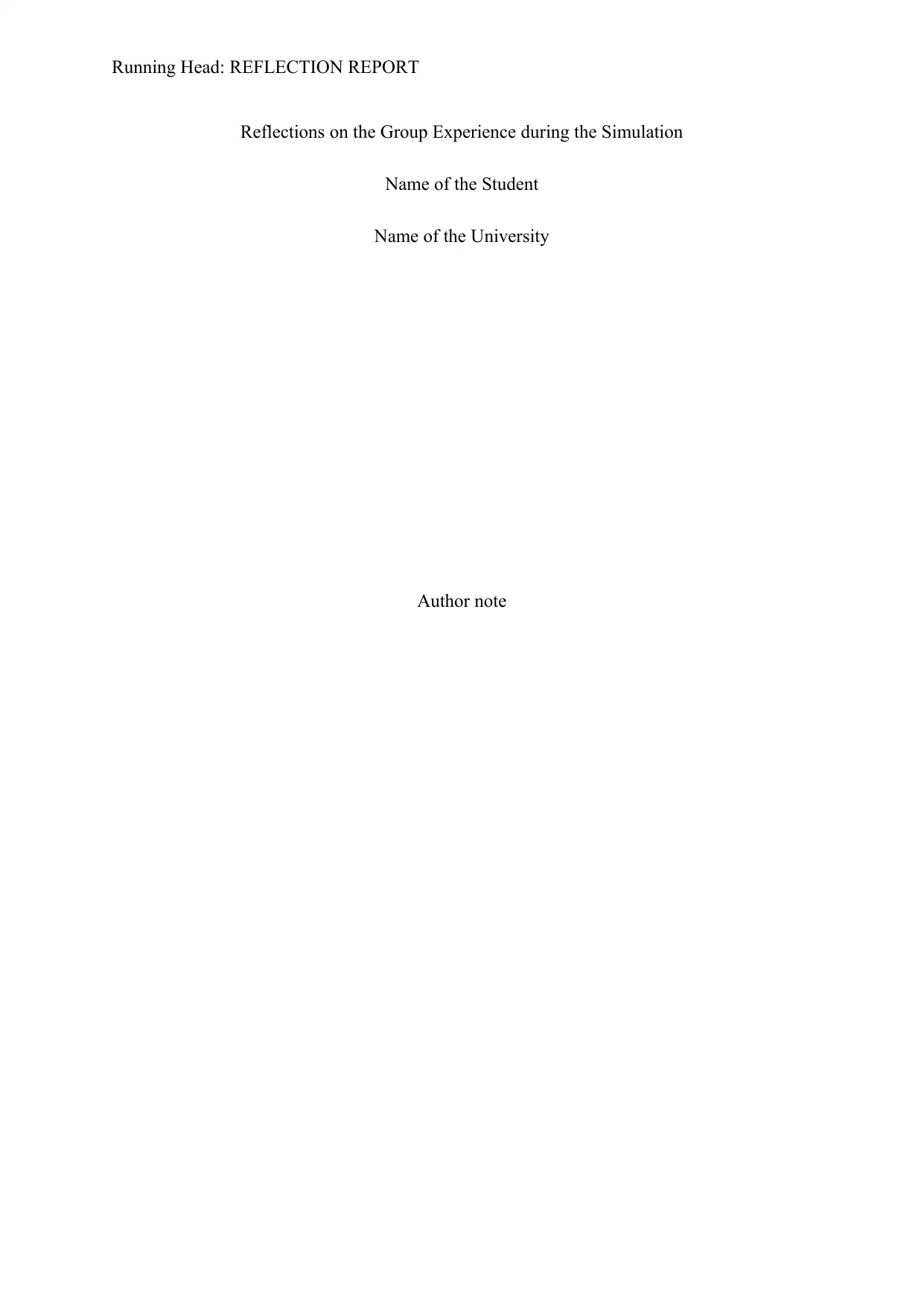
Running Head: REFLECTION REPORT
Reflections on the Group Experience during the Simulation
Name of the Student
Name of the University
Author note
Reflections on the Group Experience during the Simulation
Name of the Student
Name of the University
Author note
Paraphrase This Document
Need a fresh take? Get an instant paraphrase of this document with our AI Paraphraser
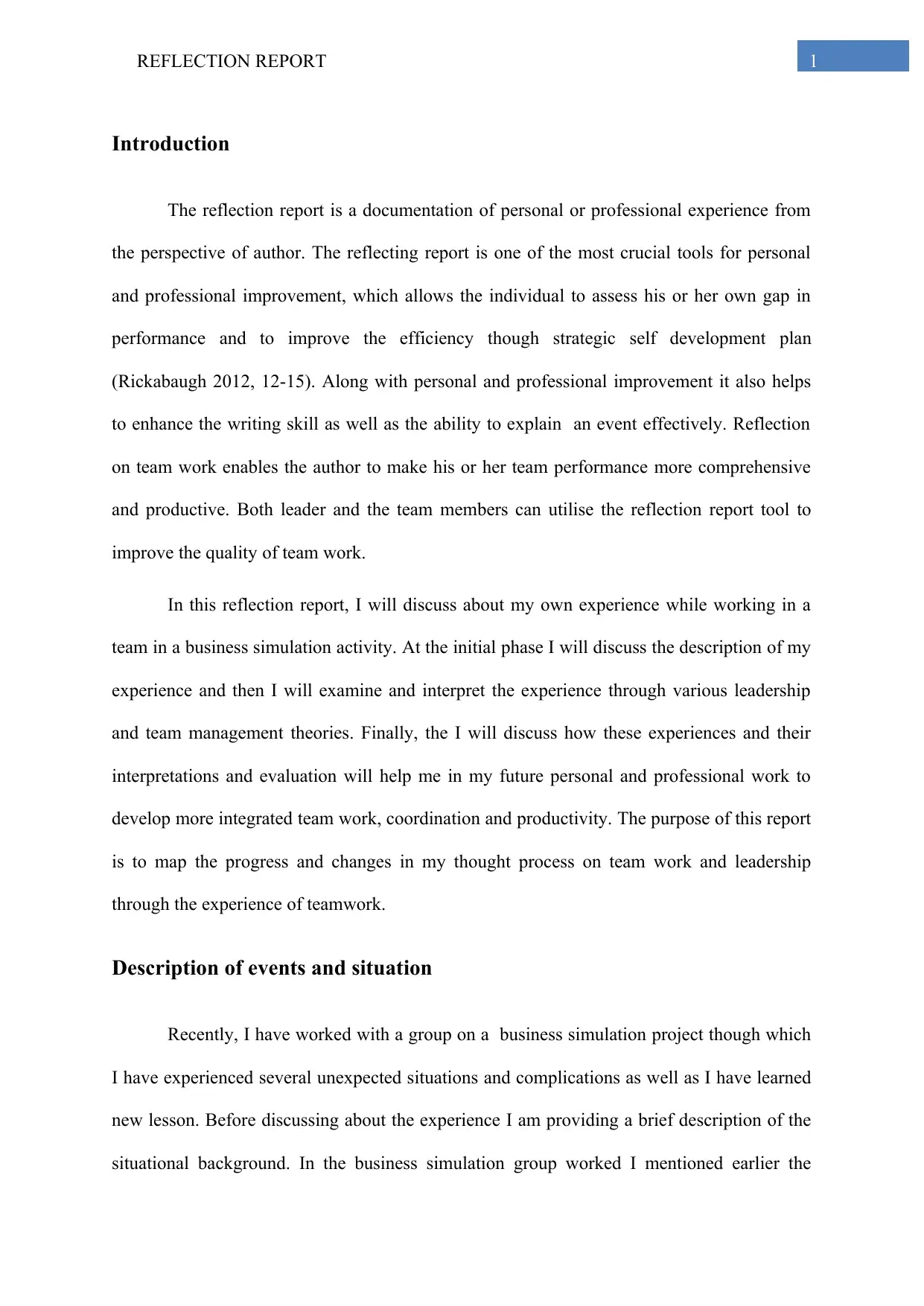
1REFLECTION REPORT
Introduction
The reflection report is a documentation of personal or professional experience from
the perspective of author. The reflecting report is one of the most crucial tools for personal
and professional improvement, which allows the individual to assess his or her own gap in
performance and to improve the efficiency though strategic self development plan
(Rickabaugh 2012, 12-15). Along with personal and professional improvement it also helps
to enhance the writing skill as well as the ability to explain an event effectively. Reflection
on team work enables the author to make his or her team performance more comprehensive
and productive. Both leader and the team members can utilise the reflection report tool to
improve the quality of team work.
In this reflection report, I will discuss about my own experience while working in a
team in a business simulation activity. At the initial phase I will discuss the description of my
experience and then I will examine and interpret the experience through various leadership
and team management theories. Finally, the I will discuss how these experiences and their
interpretations and evaluation will help me in my future personal and professional work to
develop more integrated team work, coordination and productivity. The purpose of this report
is to map the progress and changes in my thought process on team work and leadership
through the experience of teamwork.
Description of events and situation
Recently, I have worked with a group on a business simulation project though which
I have experienced several unexpected situations and complications as well as I have learned
new lesson. Before discussing about the experience I am providing a brief description of the
situational background. In the business simulation group worked I mentioned earlier the
Introduction
The reflection report is a documentation of personal or professional experience from
the perspective of author. The reflecting report is one of the most crucial tools for personal
and professional improvement, which allows the individual to assess his or her own gap in
performance and to improve the efficiency though strategic self development plan
(Rickabaugh 2012, 12-15). Along with personal and professional improvement it also helps
to enhance the writing skill as well as the ability to explain an event effectively. Reflection
on team work enables the author to make his or her team performance more comprehensive
and productive. Both leader and the team members can utilise the reflection report tool to
improve the quality of team work.
In this reflection report, I will discuss about my own experience while working in a
team in a business simulation activity. At the initial phase I will discuss the description of my
experience and then I will examine and interpret the experience through various leadership
and team management theories. Finally, the I will discuss how these experiences and their
interpretations and evaluation will help me in my future personal and professional work to
develop more integrated team work, coordination and productivity. The purpose of this report
is to map the progress and changes in my thought process on team work and leadership
through the experience of teamwork.
Description of events and situation
Recently, I have worked with a group on a business simulation project though which
I have experienced several unexpected situations and complications as well as I have learned
new lesson. Before discussing about the experience I am providing a brief description of the
situational background. In the business simulation group worked I mentioned earlier the
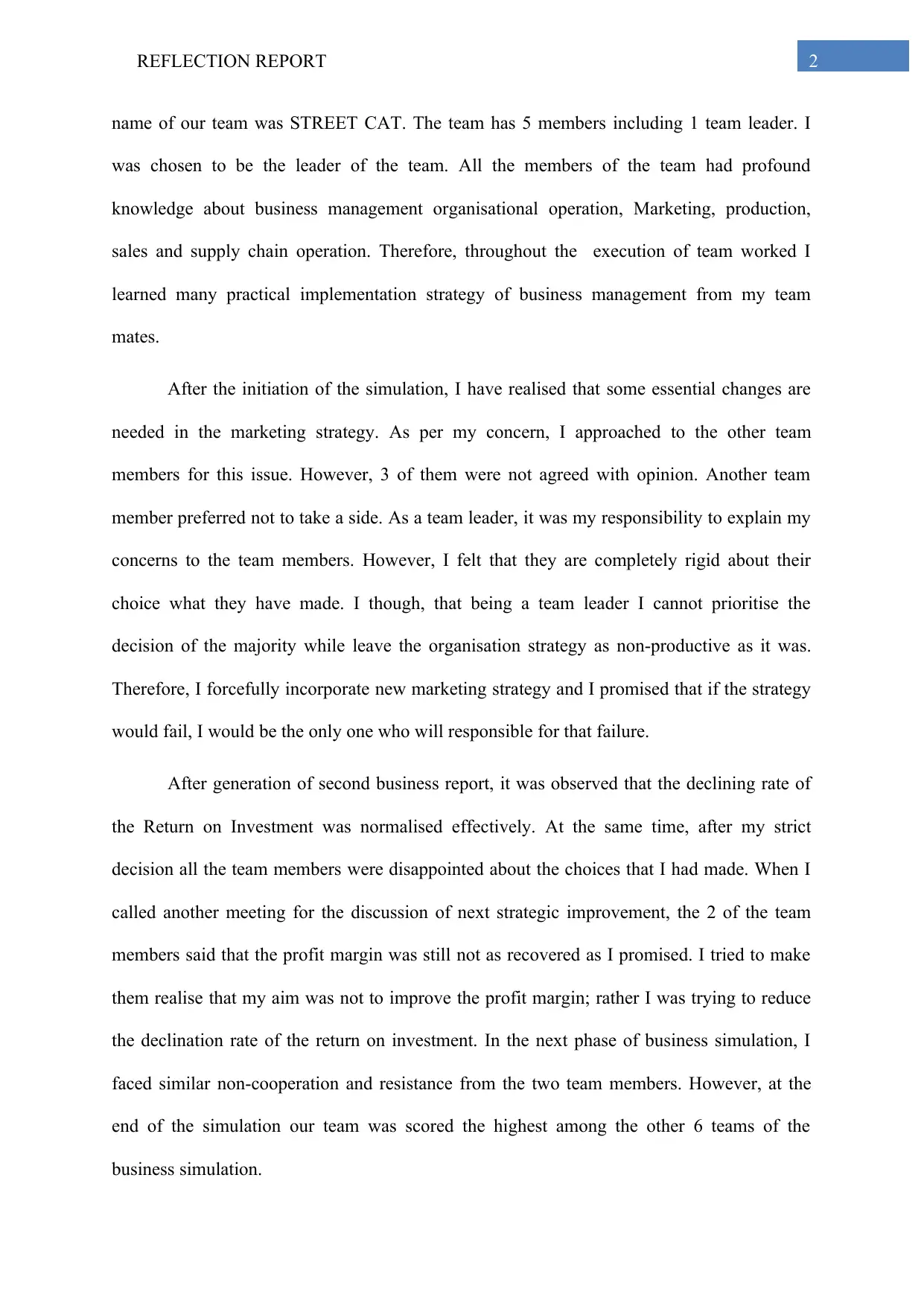
2REFLECTION REPORT
name of our team was STREET CAT. The team has 5 members including 1 team leader. I
was chosen to be the leader of the team. All the members of the team had profound
knowledge about business management organisational operation, Marketing, production,
sales and supply chain operation. Therefore, throughout the execution of team worked I
learned many practical implementation strategy of business management from my team
mates.
After the initiation of the simulation, I have realised that some essential changes are
needed in the marketing strategy. As per my concern, I approached to the other team
members for this issue. However, 3 of them were not agreed with opinion. Another team
member preferred not to take a side. As a team leader, it was my responsibility to explain my
concerns to the team members. However, I felt that they are completely rigid about their
choice what they have made. I though, that being a team leader I cannot prioritise the
decision of the majority while leave the organisation strategy as non-productive as it was.
Therefore, I forcefully incorporate new marketing strategy and I promised that if the strategy
would fail, I would be the only one who will responsible for that failure.
After generation of second business report, it was observed that the declining rate of
the Return on Investment was normalised effectively. At the same time, after my strict
decision all the team members were disappointed about the choices that I had made. When I
called another meeting for the discussion of next strategic improvement, the 2 of the team
members said that the profit margin was still not as recovered as I promised. I tried to make
them realise that my aim was not to improve the profit margin; rather I was trying to reduce
the declination rate of the return on investment. In the next phase of business simulation, I
faced similar non-cooperation and resistance from the two team members. However, at the
end of the simulation our team was scored the highest among the other 6 teams of the
business simulation.
name of our team was STREET CAT. The team has 5 members including 1 team leader. I
was chosen to be the leader of the team. All the members of the team had profound
knowledge about business management organisational operation, Marketing, production,
sales and supply chain operation. Therefore, throughout the execution of team worked I
learned many practical implementation strategy of business management from my team
mates.
After the initiation of the simulation, I have realised that some essential changes are
needed in the marketing strategy. As per my concern, I approached to the other team
members for this issue. However, 3 of them were not agreed with opinion. Another team
member preferred not to take a side. As a team leader, it was my responsibility to explain my
concerns to the team members. However, I felt that they are completely rigid about their
choice what they have made. I though, that being a team leader I cannot prioritise the
decision of the majority while leave the organisation strategy as non-productive as it was.
Therefore, I forcefully incorporate new marketing strategy and I promised that if the strategy
would fail, I would be the only one who will responsible for that failure.
After generation of second business report, it was observed that the declining rate of
the Return on Investment was normalised effectively. At the same time, after my strict
decision all the team members were disappointed about the choices that I had made. When I
called another meeting for the discussion of next strategic improvement, the 2 of the team
members said that the profit margin was still not as recovered as I promised. I tried to make
them realise that my aim was not to improve the profit margin; rather I was trying to reduce
the declination rate of the return on investment. In the next phase of business simulation, I
faced similar non-cooperation and resistance from the two team members. However, at the
end of the simulation our team was scored the highest among the other 6 teams of the
business simulation.
⊘ This is a preview!⊘
Do you want full access?
Subscribe today to unlock all pages.

Trusted by 1+ million students worldwide
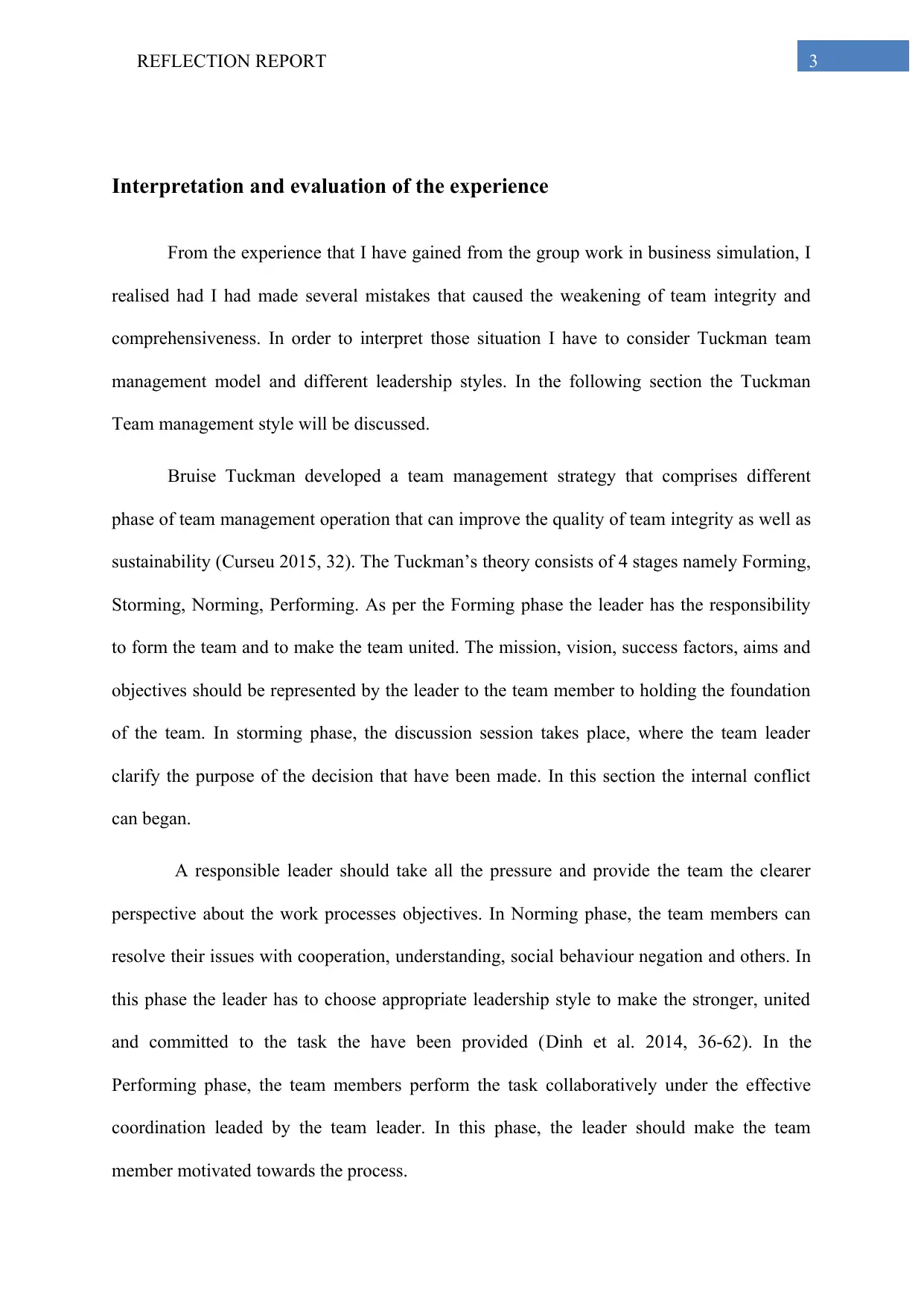
3REFLECTION REPORT
Interpretation and evaluation of the experience
From the experience that I have gained from the group work in business simulation, I
realised had I had made several mistakes that caused the weakening of team integrity and
comprehensiveness. In order to interpret those situation I have to consider Tuckman team
management model and different leadership styles. In the following section the Tuckman
Team management style will be discussed.
Bruise Tuckman developed a team management strategy that comprises different
phase of team management operation that can improve the quality of team integrity as well as
sustainability (Curseu 2015, 32). The Tuckman’s theory consists of 4 stages namely Forming,
Storming, Norming, Performing. As per the Forming phase the leader has the responsibility
to form the team and to make the team united. The mission, vision, success factors, aims and
objectives should be represented by the leader to the team member to holding the foundation
of the team. In storming phase, the discussion session takes place, where the team leader
clarify the purpose of the decision that have been made. In this section the internal conflict
can began.
A responsible leader should take all the pressure and provide the team the clearer
perspective about the work processes objectives. In Norming phase, the team members can
resolve their issues with cooperation, understanding, social behaviour negation and others. In
this phase the leader has to choose appropriate leadership style to make the stronger, united
and committed to the task the have been provided (Dinh et al. 2014, 36-62). In the
Performing phase, the team members perform the task collaboratively under the effective
coordination leaded by the team leader. In this phase, the leader should make the team
member motivated towards the process.
Interpretation and evaluation of the experience
From the experience that I have gained from the group work in business simulation, I
realised had I had made several mistakes that caused the weakening of team integrity and
comprehensiveness. In order to interpret those situation I have to consider Tuckman team
management model and different leadership styles. In the following section the Tuckman
Team management style will be discussed.
Bruise Tuckman developed a team management strategy that comprises different
phase of team management operation that can improve the quality of team integrity as well as
sustainability (Curseu 2015, 32). The Tuckman’s theory consists of 4 stages namely Forming,
Storming, Norming, Performing. As per the Forming phase the leader has the responsibility
to form the team and to make the team united. The mission, vision, success factors, aims and
objectives should be represented by the leader to the team member to holding the foundation
of the team. In storming phase, the discussion session takes place, where the team leader
clarify the purpose of the decision that have been made. In this section the internal conflict
can began.
A responsible leader should take all the pressure and provide the team the clearer
perspective about the work processes objectives. In Norming phase, the team members can
resolve their issues with cooperation, understanding, social behaviour negation and others. In
this phase the leader has to choose appropriate leadership style to make the stronger, united
and committed to the task the have been provided (Dinh et al. 2014, 36-62). In the
Performing phase, the team members perform the task collaboratively under the effective
coordination leaded by the team leader. In this phase, the leader should make the team
member motivated towards the process.
Paraphrase This Document
Need a fresh take? Get an instant paraphrase of this document with our AI Paraphraser
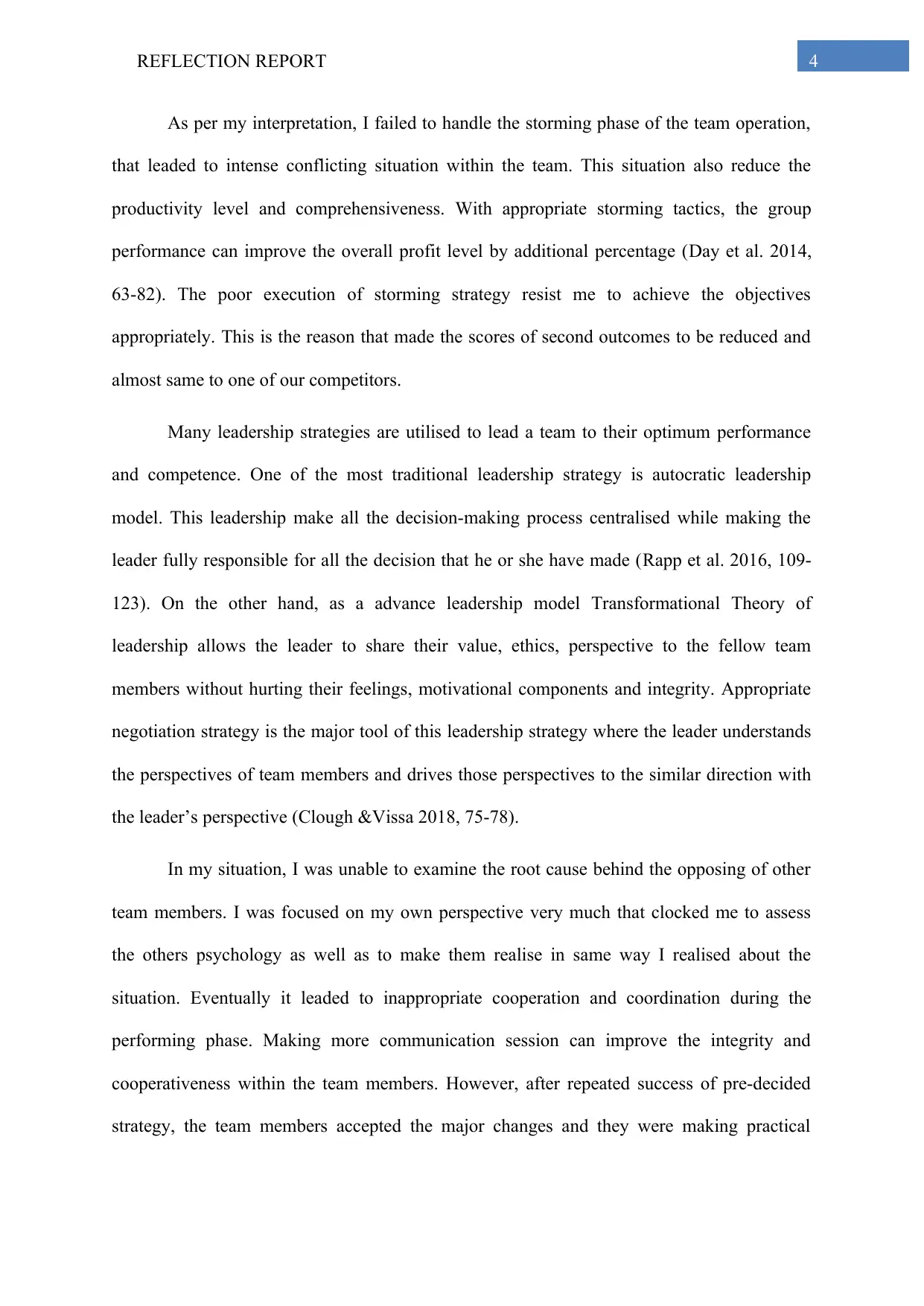
4REFLECTION REPORT
As per my interpretation, I failed to handle the storming phase of the team operation,
that leaded to intense conflicting situation within the team. This situation also reduce the
productivity level and comprehensiveness. With appropriate storming tactics, the group
performance can improve the overall profit level by additional percentage (Day et al. 2014,
63-82). The poor execution of storming strategy resist me to achieve the objectives
appropriately. This is the reason that made the scores of second outcomes to be reduced and
almost same to one of our competitors.
Many leadership strategies are utilised to lead a team to their optimum performance
and competence. One of the most traditional leadership strategy is autocratic leadership
model. This leadership make all the decision-making process centralised while making the
leader fully responsible for all the decision that he or she have made (Rapp et al. 2016, 109-
123). On the other hand, as a advance leadership model Transformational Theory of
leadership allows the leader to share their value, ethics, perspective to the fellow team
members without hurting their feelings, motivational components and integrity. Appropriate
negotiation strategy is the major tool of this leadership strategy where the leader understands
the perspectives of team members and drives those perspectives to the similar direction with
the leader’s perspective (Clough &Vissa 2018, 75-78).
In my situation, I was unable to examine the root cause behind the opposing of other
team members. I was focused on my own perspective very much that clocked me to assess
the others psychology as well as to make them realise in same way I realised about the
situation. Eventually it leaded to inappropriate cooperation and coordination during the
performing phase. Making more communication session can improve the integrity and
cooperativeness within the team members. However, after repeated success of pre-decided
strategy, the team members accepted the major changes and they were making practical
As per my interpretation, I failed to handle the storming phase of the team operation,
that leaded to intense conflicting situation within the team. This situation also reduce the
productivity level and comprehensiveness. With appropriate storming tactics, the group
performance can improve the overall profit level by additional percentage (Day et al. 2014,
63-82). The poor execution of storming strategy resist me to achieve the objectives
appropriately. This is the reason that made the scores of second outcomes to be reduced and
almost same to one of our competitors.
Many leadership strategies are utilised to lead a team to their optimum performance
and competence. One of the most traditional leadership strategy is autocratic leadership
model. This leadership make all the decision-making process centralised while making the
leader fully responsible for all the decision that he or she have made (Rapp et al. 2016, 109-
123). On the other hand, as a advance leadership model Transformational Theory of
leadership allows the leader to share their value, ethics, perspective to the fellow team
members without hurting their feelings, motivational components and integrity. Appropriate
negotiation strategy is the major tool of this leadership strategy where the leader understands
the perspectives of team members and drives those perspectives to the similar direction with
the leader’s perspective (Clough &Vissa 2018, 75-78).
In my situation, I was unable to examine the root cause behind the opposing of other
team members. I was focused on my own perspective very much that clocked me to assess
the others psychology as well as to make them realise in same way I realised about the
situation. Eventually it leaded to inappropriate cooperation and coordination during the
performing phase. Making more communication session can improve the integrity and
cooperativeness within the team members. However, after repeated success of pre-decided
strategy, the team members accepted the major changes and they were making practical
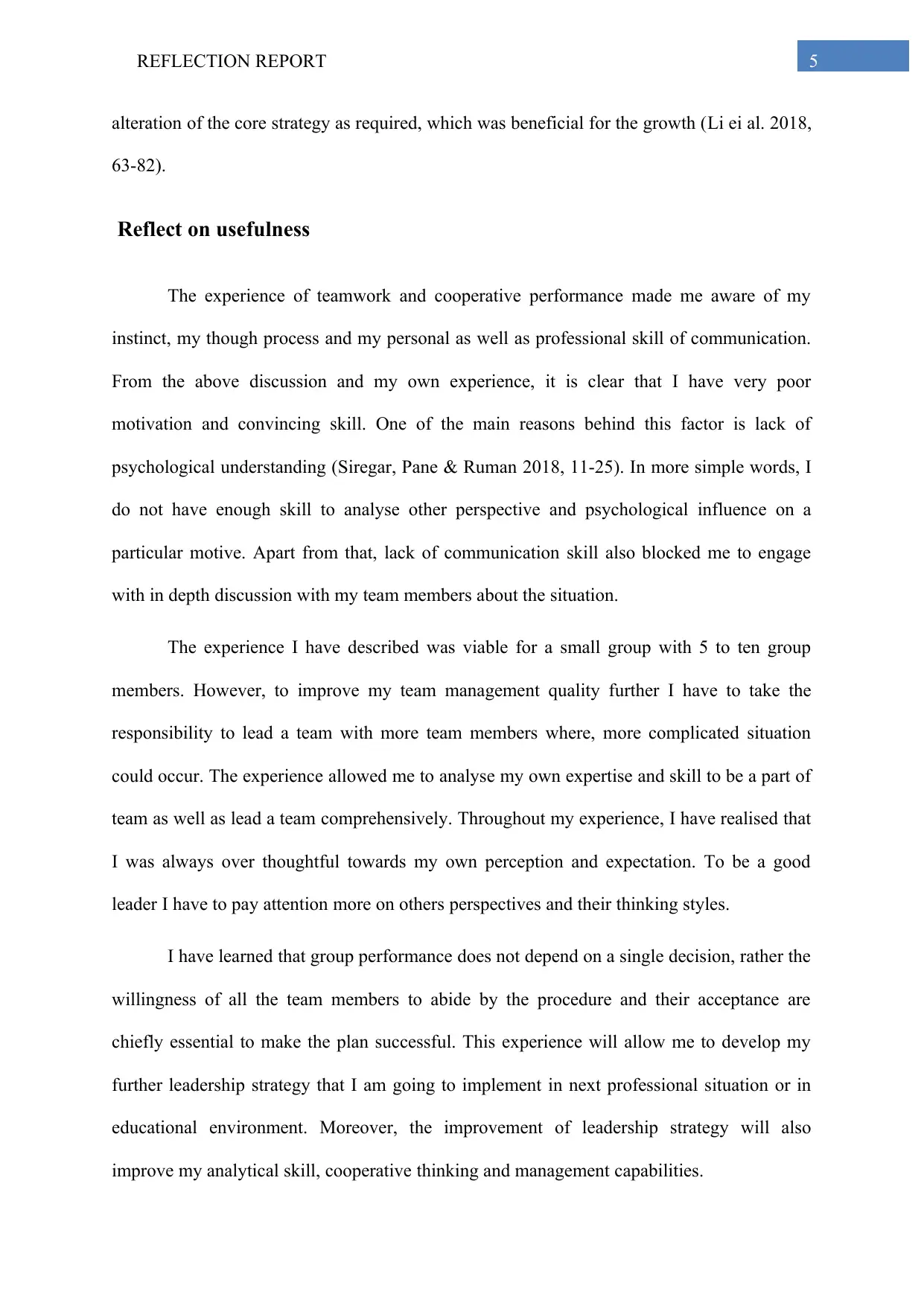
5REFLECTION REPORT
alteration of the core strategy as required, which was beneficial for the growth (Li ei al. 2018,
63-82).
Reflect on usefulness
The experience of teamwork and cooperative performance made me aware of my
instinct, my though process and my personal as well as professional skill of communication.
From the above discussion and my own experience, it is clear that I have very poor
motivation and convincing skill. One of the main reasons behind this factor is lack of
psychological understanding (Siregar, Pane & Ruman 2018, 11-25). In more simple words, I
do not have enough skill to analyse other perspective and psychological influence on a
particular motive. Apart from that, lack of communication skill also blocked me to engage
with in depth discussion with my team members about the situation.
The experience I have described was viable for a small group with 5 to ten group
members. However, to improve my team management quality further I have to take the
responsibility to lead a team with more team members where, more complicated situation
could occur. The experience allowed me to analyse my own expertise and skill to be a part of
team as well as lead a team comprehensively. Throughout my experience, I have realised that
I was always over thoughtful towards my own perception and expectation. To be a good
leader I have to pay attention more on others perspectives and their thinking styles.
I have learned that group performance does not depend on a single decision, rather the
willingness of all the team members to abide by the procedure and their acceptance are
chiefly essential to make the plan successful. This experience will allow me to develop my
further leadership strategy that I am going to implement in next professional situation or in
educational environment. Moreover, the improvement of leadership strategy will also
improve my analytical skill, cooperative thinking and management capabilities.
alteration of the core strategy as required, which was beneficial for the growth (Li ei al. 2018,
63-82).
Reflect on usefulness
The experience of teamwork and cooperative performance made me aware of my
instinct, my though process and my personal as well as professional skill of communication.
From the above discussion and my own experience, it is clear that I have very poor
motivation and convincing skill. One of the main reasons behind this factor is lack of
psychological understanding (Siregar, Pane & Ruman 2018, 11-25). In more simple words, I
do not have enough skill to analyse other perspective and psychological influence on a
particular motive. Apart from that, lack of communication skill also blocked me to engage
with in depth discussion with my team members about the situation.
The experience I have described was viable for a small group with 5 to ten group
members. However, to improve my team management quality further I have to take the
responsibility to lead a team with more team members where, more complicated situation
could occur. The experience allowed me to analyse my own expertise and skill to be a part of
team as well as lead a team comprehensively. Throughout my experience, I have realised that
I was always over thoughtful towards my own perception and expectation. To be a good
leader I have to pay attention more on others perspectives and their thinking styles.
I have learned that group performance does not depend on a single decision, rather the
willingness of all the team members to abide by the procedure and their acceptance are
chiefly essential to make the plan successful. This experience will allow me to develop my
further leadership strategy that I am going to implement in next professional situation or in
educational environment. Moreover, the improvement of leadership strategy will also
improve my analytical skill, cooperative thinking and management capabilities.
⊘ This is a preview!⊘
Do you want full access?
Subscribe today to unlock all pages.

Trusted by 1+ million students worldwide
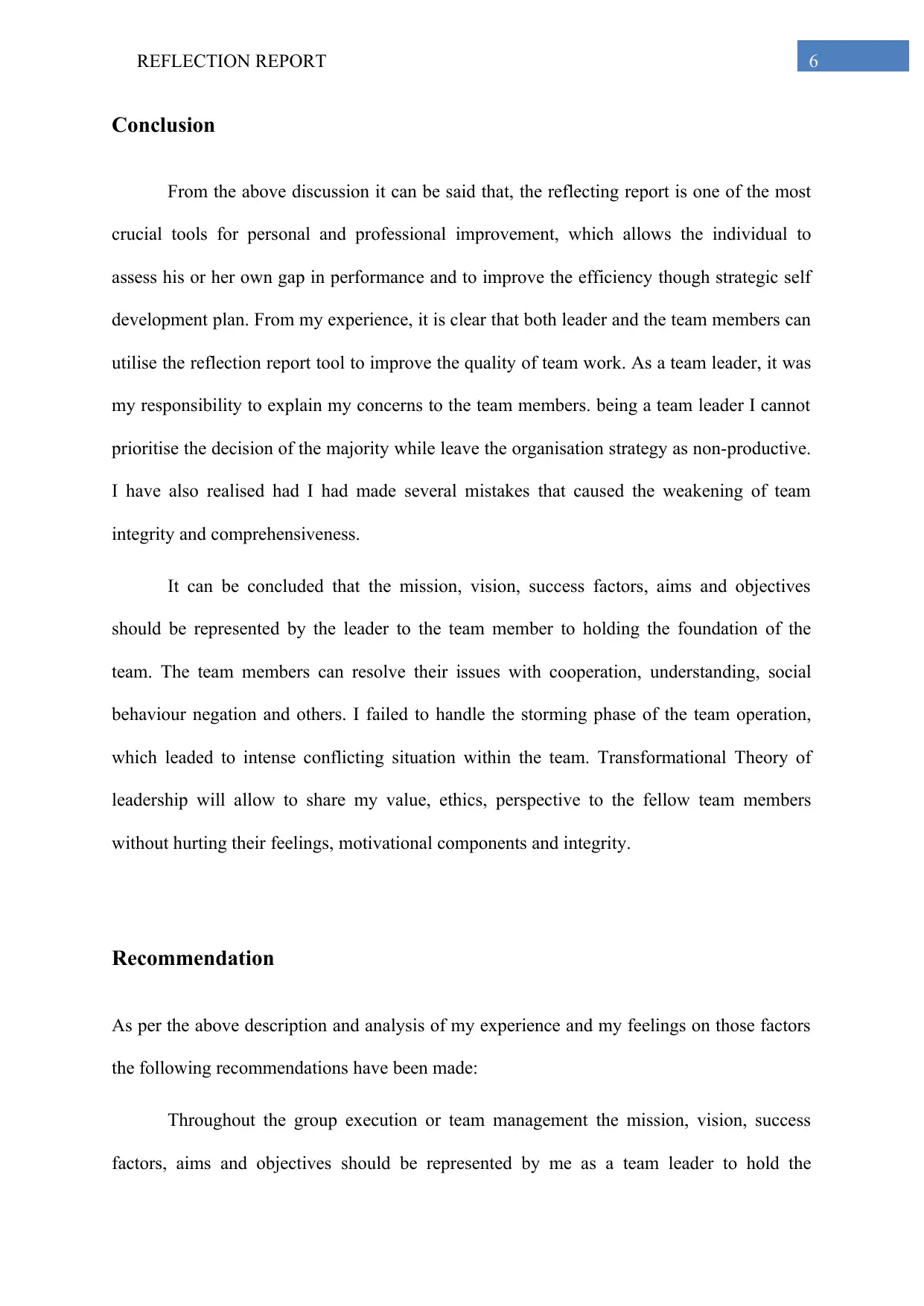
6REFLECTION REPORT
Conclusion
From the above discussion it can be said that, the reflecting report is one of the most
crucial tools for personal and professional improvement, which allows the individual to
assess his or her own gap in performance and to improve the efficiency though strategic self
development plan. From my experience, it is clear that both leader and the team members can
utilise the reflection report tool to improve the quality of team work. As a team leader, it was
my responsibility to explain my concerns to the team members. being a team leader I cannot
prioritise the decision of the majority while leave the organisation strategy as non-productive.
I have also realised had I had made several mistakes that caused the weakening of team
integrity and comprehensiveness.
It can be concluded that the mission, vision, success factors, aims and objectives
should be represented by the leader to the team member to holding the foundation of the
team. The team members can resolve their issues with cooperation, understanding, social
behaviour negation and others. I failed to handle the storming phase of the team operation,
which leaded to intense conflicting situation within the team. Transformational Theory of
leadership will allow to share my value, ethics, perspective to the fellow team members
without hurting their feelings, motivational components and integrity.
Recommendation
As per the above description and analysis of my experience and my feelings on those factors
the following recommendations have been made:
Throughout the group execution or team management the mission, vision, success
factors, aims and objectives should be represented by me as a team leader to hold the
Conclusion
From the above discussion it can be said that, the reflecting report is one of the most
crucial tools for personal and professional improvement, which allows the individual to
assess his or her own gap in performance and to improve the efficiency though strategic self
development plan. From my experience, it is clear that both leader and the team members can
utilise the reflection report tool to improve the quality of team work. As a team leader, it was
my responsibility to explain my concerns to the team members. being a team leader I cannot
prioritise the decision of the majority while leave the organisation strategy as non-productive.
I have also realised had I had made several mistakes that caused the weakening of team
integrity and comprehensiveness.
It can be concluded that the mission, vision, success factors, aims and objectives
should be represented by the leader to the team member to holding the foundation of the
team. The team members can resolve their issues with cooperation, understanding, social
behaviour negation and others. I failed to handle the storming phase of the team operation,
which leaded to intense conflicting situation within the team. Transformational Theory of
leadership will allow to share my value, ethics, perspective to the fellow team members
without hurting their feelings, motivational components and integrity.
Recommendation
As per the above description and analysis of my experience and my feelings on those factors
the following recommendations have been made:
Throughout the group execution or team management the mission, vision, success
factors, aims and objectives should be represented by me as a team leader to hold the
Paraphrase This Document
Need a fresh take? Get an instant paraphrase of this document with our AI Paraphraser
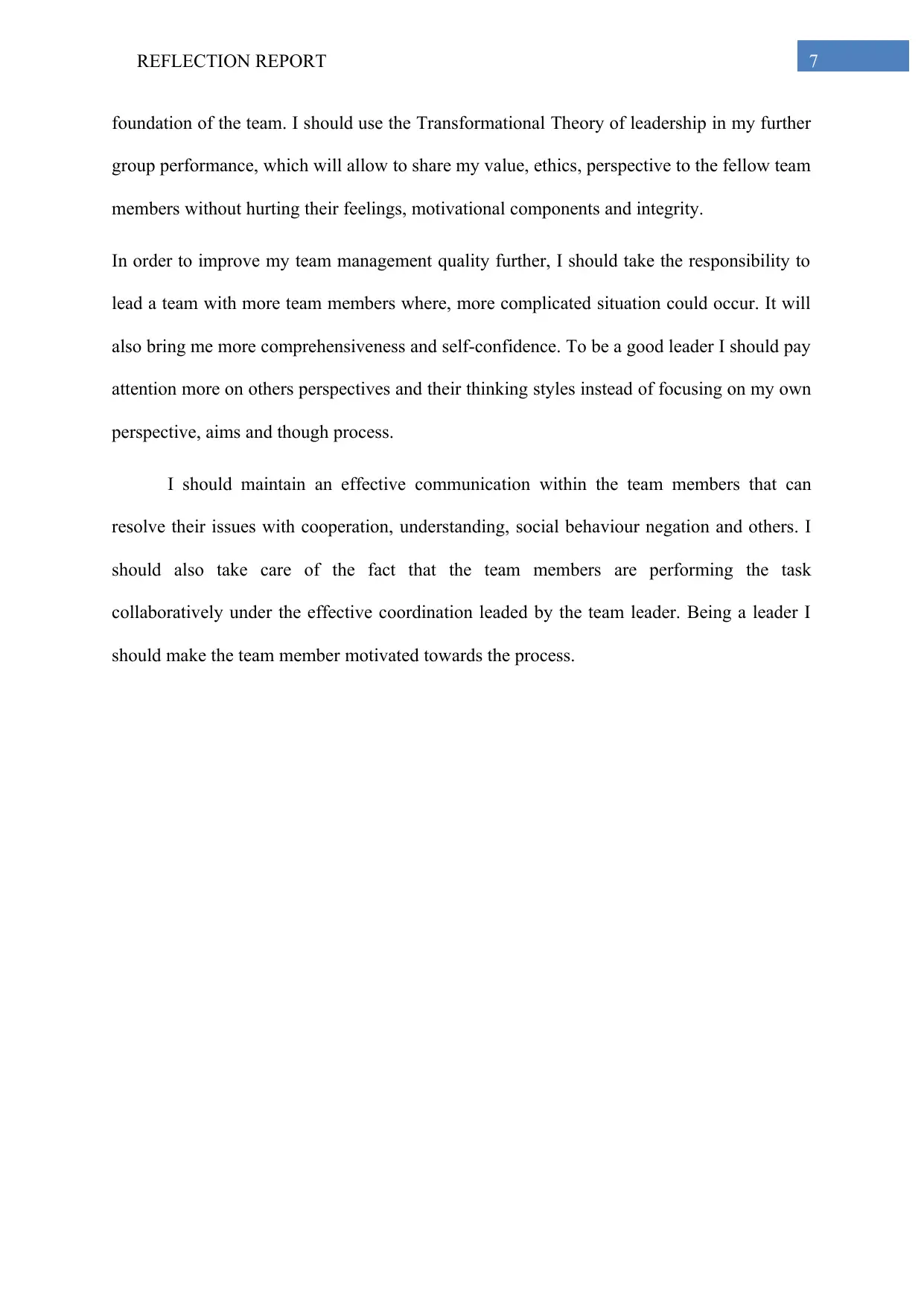
7REFLECTION REPORT
foundation of the team. I should use the Transformational Theory of leadership in my further
group performance, which will allow to share my value, ethics, perspective to the fellow team
members without hurting their feelings, motivational components and integrity.
In order to improve my team management quality further, I should take the responsibility to
lead a team with more team members where, more complicated situation could occur. It will
also bring me more comprehensiveness and self-confidence. To be a good leader I should pay
attention more on others perspectives and their thinking styles instead of focusing on my own
perspective, aims and though process.
I should maintain an effective communication within the team members that can
resolve their issues with cooperation, understanding, social behaviour negation and others. I
should also take care of the fact that the team members are performing the task
collaboratively under the effective coordination leaded by the team leader. Being a leader I
should make the team member motivated towards the process.
foundation of the team. I should use the Transformational Theory of leadership in my further
group performance, which will allow to share my value, ethics, perspective to the fellow team
members without hurting their feelings, motivational components and integrity.
In order to improve my team management quality further, I should take the responsibility to
lead a team with more team members where, more complicated situation could occur. It will
also bring me more comprehensiveness and self-confidence. To be a good leader I should pay
attention more on others perspectives and their thinking styles instead of focusing on my own
perspective, aims and though process.
I should maintain an effective communication within the team members that can
resolve their issues with cooperation, understanding, social behaviour negation and others. I
should also take care of the fact that the team members are performing the task
collaboratively under the effective coordination leaded by the team leader. Being a leader I
should make the team member motivated towards the process.
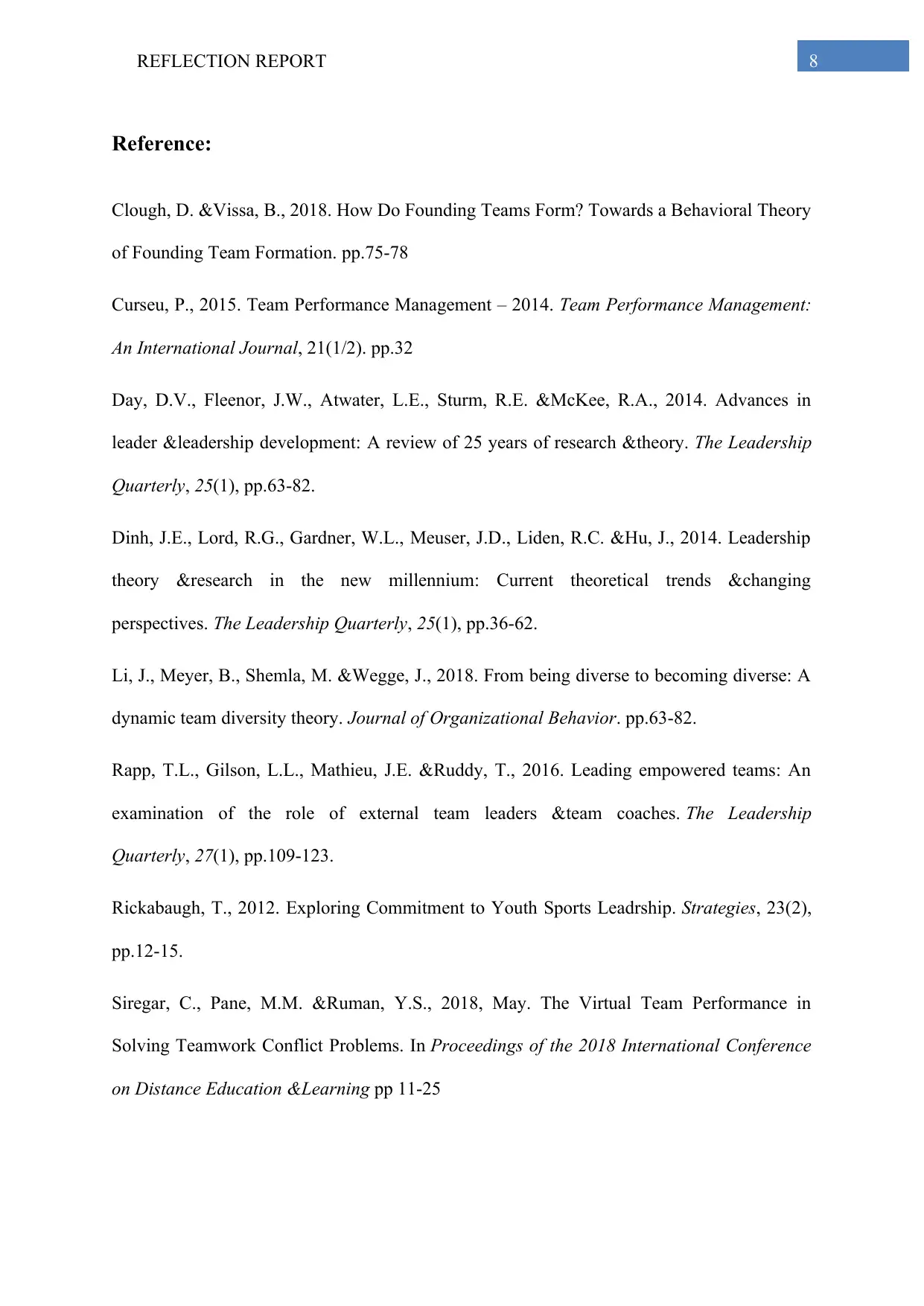
8REFLECTION REPORT
Reference:
Clough, D. &Vissa, B., 2018. How Do Founding Teams Form? Towards a Behavioral Theory
of Founding Team Formation. pp.75-78
Curseu, P., 2015. Team Performance Management – 2014. Team Performance Management:
An International Journal, 21(1/2). pp.32
Day, D.V., Fleenor, J.W., Atwater, L.E., Sturm, R.E. &McKee, R.A., 2014. Advances in
leader &leadership development: A review of 25 years of research &theory. The Leadership
Quarterly, 25(1), pp.63-82.
Dinh, J.E., Lord, R.G., Gardner, W.L., Meuser, J.D., Liden, R.C. &Hu, J., 2014. Leadership
theory &research in the new millennium: Current theoretical trends &changing
perspectives. The Leadership Quarterly, 25(1), pp.36-62.
Li, J., Meyer, B., Shemla, M. &Wegge, J., 2018. From being diverse to becoming diverse: A
dynamic team diversity theory. Journal of Organizational Behavior. pp.63-82.
Rapp, T.L., Gilson, L.L., Mathieu, J.E. &Ruddy, T., 2016. Leading empowered teams: An
examination of the role of external team leaders &team coaches. The Leadership
Quarterly, 27(1), pp.109-123.
Rickabaugh, T., 2012. Exploring Commitment to Youth Sports Leadrship. Strategies, 23(2),
pp.12-15.
Siregar, C., Pane, M.M. &Ruman, Y.S., 2018, May. The Virtual Team Performance in
Solving Teamwork Conflict Problems. In Proceedings of the 2018 International Conference
on Distance Education &Learning pp 11-25
Reference:
Clough, D. &Vissa, B., 2018. How Do Founding Teams Form? Towards a Behavioral Theory
of Founding Team Formation. pp.75-78
Curseu, P., 2015. Team Performance Management – 2014. Team Performance Management:
An International Journal, 21(1/2). pp.32
Day, D.V., Fleenor, J.W., Atwater, L.E., Sturm, R.E. &McKee, R.A., 2014. Advances in
leader &leadership development: A review of 25 years of research &theory. The Leadership
Quarterly, 25(1), pp.63-82.
Dinh, J.E., Lord, R.G., Gardner, W.L., Meuser, J.D., Liden, R.C. &Hu, J., 2014. Leadership
theory &research in the new millennium: Current theoretical trends &changing
perspectives. The Leadership Quarterly, 25(1), pp.36-62.
Li, J., Meyer, B., Shemla, M. &Wegge, J., 2018. From being diverse to becoming diverse: A
dynamic team diversity theory. Journal of Organizational Behavior. pp.63-82.
Rapp, T.L., Gilson, L.L., Mathieu, J.E. &Ruddy, T., 2016. Leading empowered teams: An
examination of the role of external team leaders &team coaches. The Leadership
Quarterly, 27(1), pp.109-123.
Rickabaugh, T., 2012. Exploring Commitment to Youth Sports Leadrship. Strategies, 23(2),
pp.12-15.
Siregar, C., Pane, M.M. &Ruman, Y.S., 2018, May. The Virtual Team Performance in
Solving Teamwork Conflict Problems. In Proceedings of the 2018 International Conference
on Distance Education &Learning pp 11-25
⊘ This is a preview!⊘
Do you want full access?
Subscribe today to unlock all pages.

Trusted by 1+ million students worldwide
1 out of 9
Related Documents
Your All-in-One AI-Powered Toolkit for Academic Success.
+13062052269
info@desklib.com
Available 24*7 on WhatsApp / Email
![[object Object]](/_next/static/media/star-bottom.7253800d.svg)
Unlock your academic potential
Copyright © 2020–2026 A2Z Services. All Rights Reserved. Developed and managed by ZUCOL.





